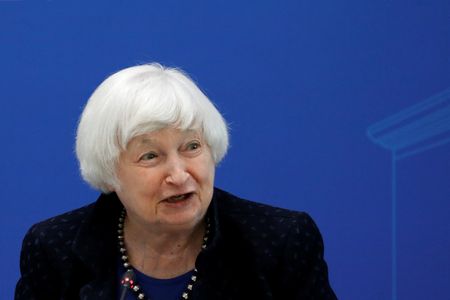By Andrea Shalal
WASHINGTON (Reuters) -The U.S. and its Group of Seven (G7) allies are continuing to explore a range of possibilities to unlock the value of nearly $300 billion in frozen Russian assets to aid Ukraine, U.S. Treasury Secretary Janet Yellen said on Tuesday.
Yellen said the United States and the G7 were absolutely committed to Ukraine’s support, and she urged Congress to approve urgently needed military and budgetary support.
“This is a humanitarian and moral imperative, and also an economic war, given the war’s significant negative impact on economies around the world,” Yellen said in a news conference on the sidelines of the spring meetings of the International Monetary Fund and World Bank in Washington.
Yellen said she feared Russia could be emboldened by the domestic debate in the U.S. and elsewhere over continued aid to Ukraine.
“I do fear that Russia is beginning to see signs that the U.S. and our allies are tiring, or finding it more difficult to find ways to support Ukraine, and that gives them hope that they can outlast us and wait for our resolve to crumble,” she said.
But Ukraine needs ongoing streams of support, and that was driving the quest to monetize the frozen Russian assets, she added.
Yellen said she had engaged in many conversations about the issue and it would be discussed at a meeting of Group of Seven (G7) advanced economies on Wednesday.
She said a series of possibilities were under discussion, from seizing assets outright to using them as collateral, noting that Washington was “very supportive” of recent moves by the European Union to segregate the interest income from the immobilized assets.
A senior Treasury official said no options had been taken off the table but noted that Ukraine also wouldn’t have the capacity to absorb the full amount at once, even if all the frozen assets were seized.
One of the most promising proposals under consideration would see G7 countries pull forward the interest due on the frozen Russian assets to use as collateral for loans or bonds issued to help Ukraine, sources familiar with the issue said.
Ukrainian Finance Minister Serhiy Marchenko told Reuters he would meet with German Finance Minister Christian Lindner and other G7 officials this week, underscoring the need for G7 unity on whatever approach was chosen.
The United States insists there is a solid basis in international law for seizure of the Russian assets, but Germany and France have raised concerns about any such move, worried that it could set dangerous precedents.
Using the interest from the assets as collateral for loans or bonds would not require seizure of the assets.
Yellen said Western officials were evaluating the risks involved in any such move, including Russian threats of retaliation, but expressed confidence they could be mitigated.
Discussions would continue this week, the Treasury official said, but no major milestones were expected. The official declined to say which option was more likely, noting that the ultimate decision would be made by G7 leaders.
The official noted that past actions – including the freezing of the assets in the first place – had also appeared unlikely in the months before they were implemented.
(Reporting by Andrea Shalal; Editing by Chizu Nomiyama, Paul Simao and Andrea Ricci)





